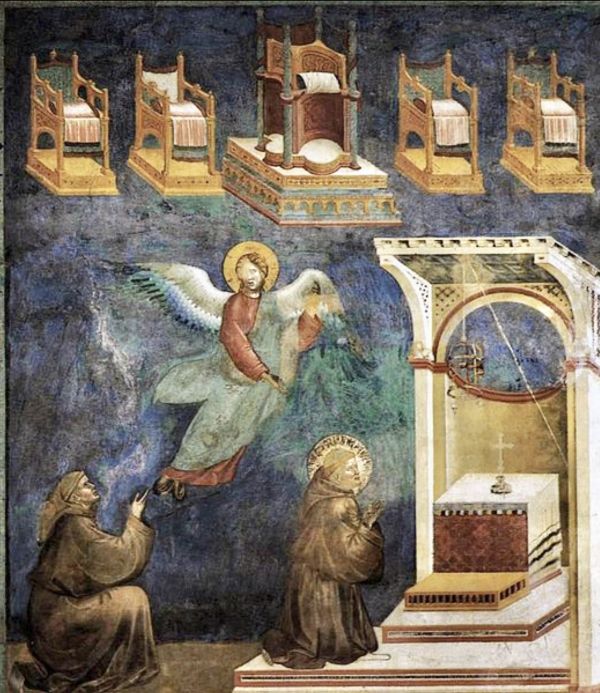When the nations are gathered before the Lord, the works of blessing performed will speak for them.
They will be in the divine condition those who recognised Christ himself in the needy of all kinds, perhaps without having realised it.
They will not be in the eternal Light who did not serve the small and infirm.
Francis, a creature of noble and sensitive heart, from his youth, before the poor felt in his conscience the need not to turn away.
This tender inclination increased considerably after meeting the Lord.
We read in the Sources stupendous documentation of real life.
"God, in fact, had infused the young Francis' soul with a feeling of generous compassion, which, growing with him from childhood, had filled his heart with goodness; so much so that even then, not a deaf hearer of the Gospel, he was willing to give to anyone who asked him, especially if he asked for the love of God.
Once, all busy in his shop, he sent away empty-handed, against his custom, a poor man who asked for alms for the love of God. But immediately, coming to his senses, he ran after him, gave him a generous alms, and promised the Lord God that from then on, when he had the chance, he would never say no to anyone who asked him for the love of God.
And he observed this intention until his death, with untiring piety, deserving to grow abundantly in the love of God and in Grace.
In fact, he would later say, when he was perfectly clothed with the sentiments of Christ, that even when he was living as a secular, he could hardly hear the love of God mentioned without feeling an inner turmoil" (FF 1018).
"Come, ye blessed of my Father [...] for I was hungry and you gave me food" (Mt 25:34).
The Sources also tell of a woman who came from Machilone to Rieti to have her eyes treated.
The doctor, who went to Francis, told him about this poor creature, claiming that he would cure her free of charge and pay the expenses himself.
The Poor Man, then, immediately went to his guardian, claiming that he had to return the goods of others.
The superior asked him what he was referring to and Francis replied:
"This is the cloak we borrowed from that poor woman who is sick of her eyes: we must return it to her" (FF 1602).
The guardian agreed.
Then the Minim called a spiritual man, with whom he was intimate. He handed him the cloak and twelve loaves, urging him to go to the oculist and have him point out the poor woman to whom he should hand it.
"Go and say to that poor and infirm woman: 'The poor man, to whom you have lent this cloak, thanks you from his heart for the loan you have made. And now, take what belongs to you'" (FF 1602).
The friend did as the saint had suggested. The woman, unable to make up her mind and in distress and suspicion, replied: 'Leave me alone. I don't know what you are saying' (FF1602).
But the man put the cloak and the twelve loaves into his hand. Then the poor woman was convinced that he meant what he said, confused between worry and happiness. Fearing, then, that the help she had received would be taken away from her, she went back to her house at night.
Francis had instructed his guardian to pay the poor sick woman's expenses every day as long as she remained in Rieti.
The Sources also underline what his brothers attested:
"We who lived with him can testify that Francis, whether healthy or infirm, overflowed with love and tenderness not only for his brothers, but towards all the poor, both healthy and sick.
He deprived himself of the necessities, which the brothers procured for him with solicitude and affection - not without showing himself caressed by us, so that we would not be disappointed - in order to offer them with great joy to others, taking from his own body even that which was indispensable" (FF 1602).
Charity speaks for itself!
"Come, ye blessed of my Father, inherit the kingdom [...] for I was hungry and you gave me food" (Mt 25:34).
Monday 1st wk. in Lent (Mt 25:31-46)












